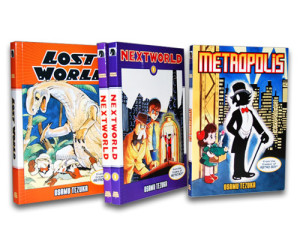Lost World/Metropolis/Next World (Dark Horse)
English Titles: Lost World | Metropolis | Next World
Japanese Titles: 前世紀 | メトロポリス | 来るべき世界
Publication Date: 2003
Publisher: Dark Horse
No. of Volumes: 1 | 1 | 2
In Print?: ✔
From the Publisher
Osamu Tezuka’s cycle of original science-fiction graphic novels, Lost World, Metropolis and Next World were published in the late 1940’s and early 1950’s.
Lost World
When a rogue planet approaches Earth, a team of scientists voyage to the world and discover a land out of the ancient past–a planet populated by dinosaurs! But a group of crooks has stowed away aboard the spacecraft, and the scientists must fight for their survival against both crooks and hungry monsters!
Metropolis
In a not-so-far-off future a beautiful, artificially created girl — unaware of her non-human background — searches for the non-existent parents she believes must exist, wandering alone in a world populated by humans and by the slave-driven robots who serve them. Tezuka’s key theme of the nature of humanity in a technological society is framed in bold relief, as well as his wry allegorical observations of the Cold War that was escalating when he created Metropolis.
Next World
When nuclear testing creates mutated animals with amazing supernatural abilities, the world and its great superpowers are drawn into political conflict that could light the fuse for World War III.
What you should know
Following up on the success of the movie adaptation of Metropolis in 2001, Dark Horse decided in 2003 to publish Osamu Tezuka’s early science-fiction trilogy, which includes Lost World, Next World and the original Metropolis manga that the film was based on. Translations were provided by Kumar Sivasubramanian and Studio Proteus, with editing consulting done by Toren Smith.
Given the rough edges of Tezuka’s earliest work, the manga was perhaps a bit dated for a modern manga audience expecting the slickness of the big-budget anime movie adaptation and did not achieve the level of success Dark Horse was hoping for. Still, these important works are a must for the serious Tezuka enthusiast as many of the themes and elements of Tezuka’s work are evident in their raw form.



